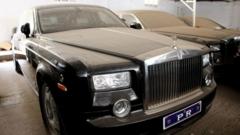The investigation follows claims that Jammeh's assets, including cars, livestock, and boats, were sold improperly, prompting protests and demands for accountability.
Gambia Launches Investigation into Sale of Former Leader's Luxury Assets

Gambia Launches Investigation into Sale of Former Leader's Luxury Assets
The Gambian government is investigating the sale of luxury assets belonging to ex-President Yahya Jammeh amid public outcry and allegations of misconduct.
The Gambian government has launched a comprehensive investigation into the controversial sale of luxury assets seized from former President Yahya Jammeh. This inquiry has emerged in response to significant public concern raised following reports suggesting irregularities during the asset liquidation process, which took place while a panel was still examining the former leader's wealth amassed during his lengthy rule from 1994 to 2017.
The investigation was triggered after a local newspaper exposed a lack of transparency and alleged corruption surrounding the sales. Some of the luxury goods— raking from high-end vehicles to valuable livestock— were sold at prices that sparked outrage among citizens. These revelations led to protests by young Gambians, demanding clarity and justice.
In a televised address, Gambian President Adama Barrow assured citizens of his administration's commitment to transparency, emphasizing that the recovered assets rightfully belong to the people. Jammeh, who fled to Equatorial Guinea after losing the 2016 elections, is accused of significant corruption, including the alleged misappropriation of at least $360 million in state funds and extensive human rights abuses.
Since coming into power, President Barrow established the Janneh Commission, which investigated corruption tied to the previous administration and recommended that Jammeh and his associates forfeit seized assets. However, recent developments have raised questions regarding the legitimacy of the ongoing asset sales.
Despite selling an extensive list of goods, certain high-profile items, including custom luxury cars, were notably absent from the official inventory. The government's assertion that all transactions were legally conducted has done little to assuage public unease, especially as journalists uncovered that many assets were sold to government insiders at undervalued prices.
Following public pressure, Barrow's administration released a comprehensive inventory of sold assets, detailing buyers, sale dates, and prices, although the listing prompted further controversy over the suspiciously low valuations. In response to the mounting distrust, Barrow convened a cabinet meeting and pledged to enforce any recommendations forthcoming from ongoing inquiries by parliament and the National Audit Office.
Critics, including opposition party activists and civil rights organizations, contend that an independent investigation is necessary to ensure accountability, arguing that the current parliament is dominated by ruling party loyalists and thus lacks impartiality.
In tandem with these local developments, the United States previously seized a Maryland mansion purchased by Jammeh with alleged funds from corruption, highlighting the international ramifications of his corrupt practices while in office.
The investigation was triggered after a local newspaper exposed a lack of transparency and alleged corruption surrounding the sales. Some of the luxury goods— raking from high-end vehicles to valuable livestock— were sold at prices that sparked outrage among citizens. These revelations led to protests by young Gambians, demanding clarity and justice.
In a televised address, Gambian President Adama Barrow assured citizens of his administration's commitment to transparency, emphasizing that the recovered assets rightfully belong to the people. Jammeh, who fled to Equatorial Guinea after losing the 2016 elections, is accused of significant corruption, including the alleged misappropriation of at least $360 million in state funds and extensive human rights abuses.
Since coming into power, President Barrow established the Janneh Commission, which investigated corruption tied to the previous administration and recommended that Jammeh and his associates forfeit seized assets. However, recent developments have raised questions regarding the legitimacy of the ongoing asset sales.
Despite selling an extensive list of goods, certain high-profile items, including custom luxury cars, were notably absent from the official inventory. The government's assertion that all transactions were legally conducted has done little to assuage public unease, especially as journalists uncovered that many assets were sold to government insiders at undervalued prices.
Following public pressure, Barrow's administration released a comprehensive inventory of sold assets, detailing buyers, sale dates, and prices, although the listing prompted further controversy over the suspiciously low valuations. In response to the mounting distrust, Barrow convened a cabinet meeting and pledged to enforce any recommendations forthcoming from ongoing inquiries by parliament and the National Audit Office.
Critics, including opposition party activists and civil rights organizations, contend that an independent investigation is necessary to ensure accountability, arguing that the current parliament is dominated by ruling party loyalists and thus lacks impartiality.
In tandem with these local developments, the United States previously seized a Maryland mansion purchased by Jammeh with alleged funds from corruption, highlighting the international ramifications of his corrupt practices while in office.






















